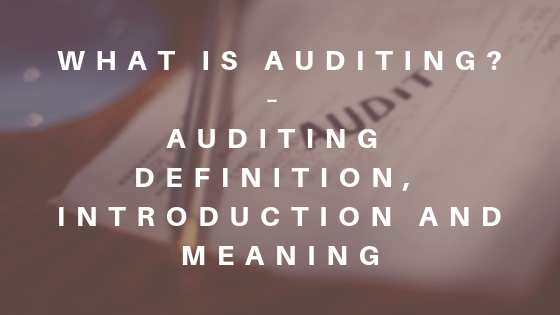The primary purpose of the audit is to confirm the authenticity of books of accounts prepared by an accountant. In this post, we will cover Auditing introduction, definitions, and functions.
It is well known saying that “where the function of accountant ends, audit begins to determine the true and fair picture of such accounts.”
Auditing Introduction
The audit is an intelligent and critical examination of the books of accounts of the business.
Auditing is done by the independent person or body of persons qualified for the job with the help of statements, papers, information and comments received from the authorities so that the examiner can confirm the authenticity of financial accounts prepared for a fixed term and report that:
- The balance sheet exhibits an accurate and fair view of the state of affairs of concern;
- The profit and loss accounts reveal the right and balanced view of the profit and loss for the financial period;
- The accounts have been prepared in conformity with the law.
Thus, it will be seen that the duty of an auditor is much more than a mere comparison of the balance sheet and accounts with the books.
But, apart from doing this, he has to satisfy himself according to his information and the explanations given to him.
Meaning of Auditing
The term audit is derived from a Latin word “audire” which means to hear authenticity of accounts is assured with the help of the independent review.
Audit is performed to ascertain the validity and reliability of information. Examination of books and accounts with supporting vouchers and documents to detect and prevent error, fraud is the primary function of auditing.
Auditor has to check the effectiveness of internal control systems for determining the extent of checking out the audit.
Initially its meaning and use were confined merely to cash audit, and the auditor has to ascertain whether the persons are responsible for the maintenance of accounts had adequately accounted for all the cash receipts and the payment on behalf of this principle.
But the word audit has an extensive usage, and it now means a thorough scrutiny of the books of accounts and its ultimate aim is to verify the financial position disclosed by the balance sheet and profit and loss accounts of a company.
In short, an audit implies an investigation and a report. The process of checking and vouching continues until the study is completed and the auditor enables himself to report under the terms of his appointment.
Definition of Auditing
“An audit is an examination of accounting records undertaken with a view of establishing whether they correctly and completely reflect the transactions to which the purport to relate.” –Lawrence R. Dickey
“Audit is defined as an investigation of some statements of figures involving examination of certain evidence, so as to enable an auditor to make a report on the statement.” –Taylor and Perry
“An audit denotes the examination of balance sheet and profit and loss accounts prepared by others together with the books of accounts and vouchers relating thereto such in such a manner that the auditor may be able to satisfy himself and honestly report that in his opinion such balance sheet is properly drawn up so as to exhibit a true and correct view of the state of affairs of a particular concern according to the information and explanations given to him and as shown by the books.” -F.R.M De Paula
“Auditing is a systematic examination of the books of records of business or other organization in order to ascertain or to verify and to report upon the facts regarding its financial operations and the result thereof.” –Prof. Montgomery
“Audit such an examination of the books of accounts and vouchers of a business as will enable the auditor to satisfy himself that the balance sheet is properly drawn up so as to give a fair and true view of the state of affairs of the business and the whether the profit and loss of accounts gives a true and fair view of profit and loss for the financial period according to the best of his information and explanations given to him and as shown by the books and if not in what respect he is not satisfied.” –Spicer & Pegler
“Audit may be said to be verification of the accuracy and correctness of the books of accounts by an independent person qualified for the job and not in any way connected with the preparation of such accounts.” -J.B. Bose
“Audit is not an inquisition and its mission is not one of fault finding. Its purpose is to bring to the notice of the administration lacunae in his rules, regulations and lapses, and to suggest possible ways and means for the execution of plans and projects with greater expedition, efficiency and economy.” –A.K. Chandra
